Mission
The Michigan Association of Planning exists so that Michigan will consist of healthy, safe, attractive, and successful communities built first and foremost on quality community planning.
GENERAL STATEMENTS
The community planning decision-making process should, first and foremost, be concerned with the long-term sustainability of our communities, environment and economy.
The community planning process should involve a broad-based citizenry, including public and private sector leaders, community interest groups and multi-disciplinary professionals. A positive relationship between development and the making of community should be established through a citizen-based participatory planning and design process.
Public policy and development practices should support development of communities that are:
- diverse in land use, population and character;
- designed for pedestrians and non-motorized transit as well as for motorized transit;
- shaped and physically defined by parks, open space and other natural resource areas;
- structured by physically defined, accessible public space and community institutions and
- based on local history, climate, ecology, and building practices.
Physical solutions by themselves will not solve all problems. A coherent and supportive physical framework should be established to provide economic vitality, community stability, and environmental health. Common challenges that should be addressed by community planning are:
- increasing opportunities for reinvestment in established urban centers;
- encouraging appropriate intensity and location of new development served by adequate public facilities;
- minimizing the spread of low density, non-contiguous development;
- encouraging a wide range of housing opportunities which serve all segments of our diverse population;
- recognizing the value and encouraging the preservation of agricultural lands and natural resources;
- encouraging the preservation and/or restoration of our natural and built heritage environments;
- encouraging development in accordance with the adopted community master plan; and
- recognizing that land use decisions may have impacts beyond community boundaries.
The quality of life for the citizens of Michigan can be enhanced by developments that:
- support and restore existing community centers;
- reconfigure existing low density, centerless communities into communities of diverse neighborhoods and districts;
- preserve and protect natural environments;
- maintain and build a positive social and strong economic climate and
- improve the physical design and condition of our region, cities, villages, townships, neighborhoods, districts, corridors, parks, streets, blocks and homes.

